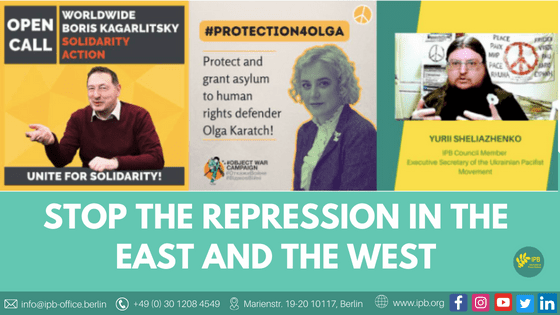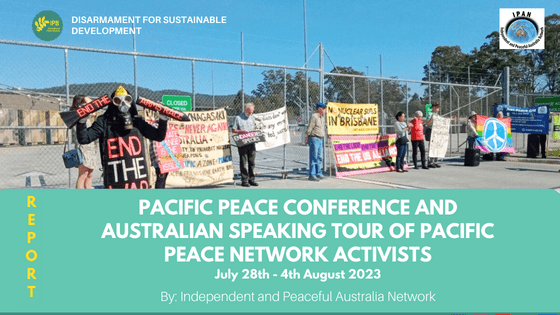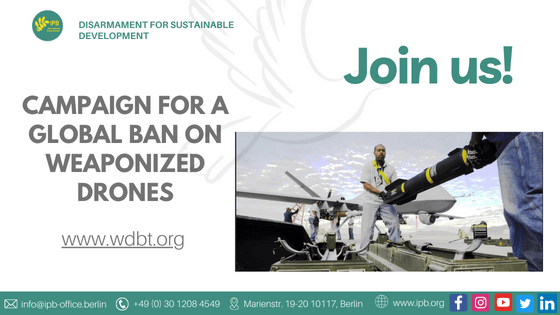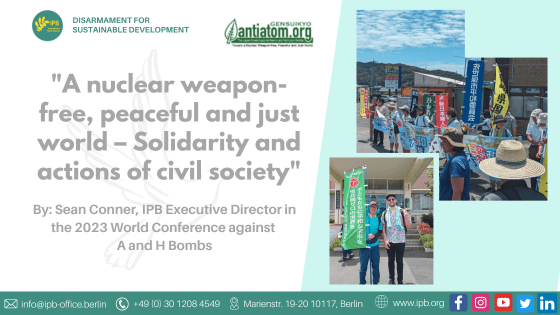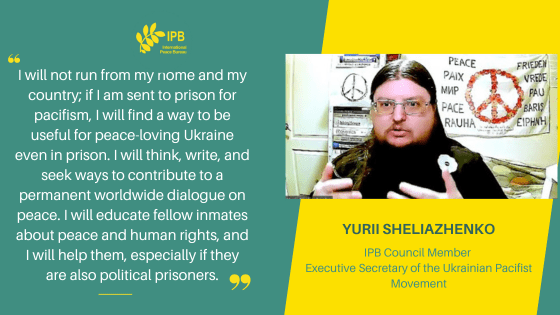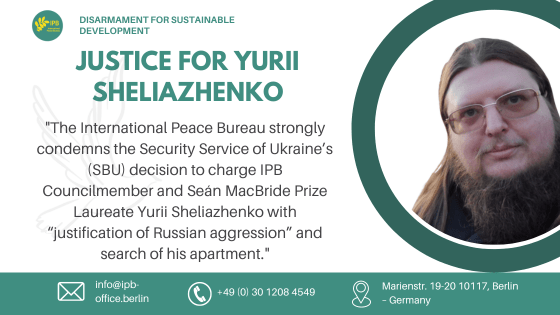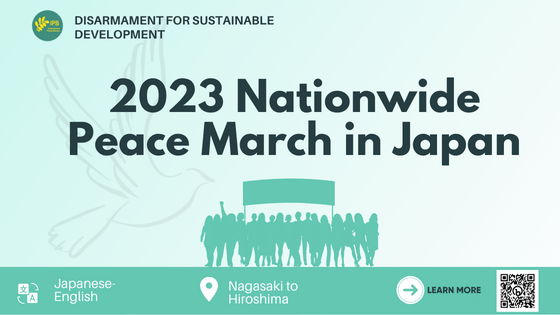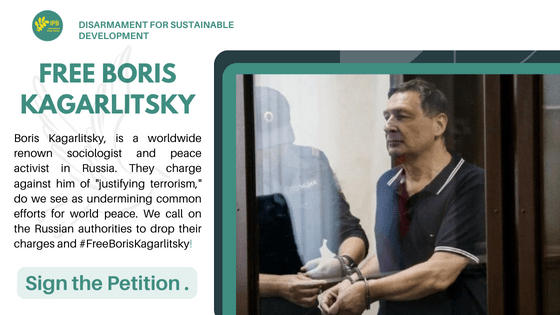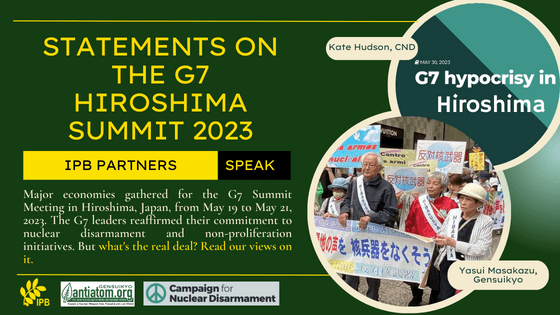The people and peace network calls on all people’s movements and parties to unitedly stand up against the persecution of independent voices of peace in East and West. Repression is increasing not only in Russia and Belarus, but also in Ukraine and also in EU countries.
This week it will be decided what punishment Boris Kagarlitsky will receive in Russia. During his detention, he was put on a list of terrorists and extremists by the authorities. He is accused by Russian security services of justifying terrorism for his war resistance.
In Kiev, Ukrainian security services boast of having stopped the “vicious Russian propagandist Yurii Sheliazhenko”. He is accused of justifying Russian aggression in a statement in which he explicitly condemns the Russian war of aggression.
In Lithuania, Belarusian pacifist Olga Karach risks being deported to Belarus with the threat of being imprisoned there. The regime-critical opponents and dissidents from Russia and Belarus who were recently well received are now increasingly seen as a national security threat in a xenophobic wave that has gained increasing political support in Lithuania.
In Sweden, pacifist organizations are subjected to slander in order to deprive them of public support and government grants. Strong movements that oppose the thrusts of militarism must be pushed out of the public conversation.
Regardless of our stance on the need for a ceasefire or sending arms to Ukraine, popular opposition to war is a factor of decisive importance. The support for non-armors and war opponents has been and is important no matter how much NATO propaganda says that the only way to peace is arms. Such support must be universal, otherwise it is has no value.
We call for joint action against oppression in East and West! Start by signing protests in support of Boris, Yurii and Olga! Spread the word and participate in uniting all against oppression wherever it occurs.
Links:
https://freeboris.info
https://ipb.org/justice-for-yurii-sheliazhenko
https://ipb.org/international-campaign-protection4olga
Adopted by the IPB 6 October 2023
Tag: peace
Pacific Peace Conference and Australian Speaking Tour of Pacific Peace Network activists
Australia – From July 28th to the 4th August 2023, a delegation of Pacific Peace activists participated in a one-day conference in Brisbane then went on to speak at events in Sydney Canberra and Darwin. The peace delegation visit coincided with the largest ever US led Talisman Sabre exercise in Australia with over 30 thousand troops participating. The so-called exercise is held in the Central Queensland Shoalwater Bay designated military training precinct.
This is not the first time that activists from around the Pacific have campaigned against Talisman Sabre. In 2007, for example, a Peace Convergence that actually travelled to the Shoalwater Bay area was convened when people from a range of Pacific States gathered to witness US and Australian troops training for war. As with the 2023 Speaking Tour, participants were able also to share their own experiences of war and the presence of US bases in their countries. Some of the issues tackled are as follows:
- the loss of sovereignty, autonomy and self-determination;
- the appropriation and destruction of indigenous ancestral land;
- the siphoning of resources away from urgent local needs, including to improve local welfare, to address climate change and to respond to increasingly severe and numerous typhoons and other corollaries of climate change.
- the aggravation of climate change through the military’s use of fossil fuels; and
- other direct impacts of the large military presence.
Read more the full report:
INTERNATIONAL CAMPAIGN #protection4olga
PROTECTION AND ASYLUM FOR HUMAN RIGHTS DEFENDER OLGA KARATCH
#protection4olga
German, French and Italian below
August 23nd 2023
Following the denial of political asylum by the Lithuanian authorities for the Belarusian peace builder and human rights defender Olga Karatch (Volha Karach), the international campaign #protection4olga has just been launched to demand protection and asylum for the director of the organisation ‘Our House‘. She has been fighting for human rights in Belarus for years, including the right to conscientious objection to military service, and is therefore persecuted and faces capital punishment in her country of origin, where she has been labelled a ‘terrorist’ by the regime.
On 18 August 2023, Lithuania denied her political asylum, calling Olga Karatch a ‘person who represents a threat to the national security of the Republic of Lithuania’. She was however granted a one-year temporary residence in the country, probably due to international letters of concerns that some politicians and heads of foundations had written to the authorities and to Lithuanian Ambassadors in different countries. But this status does not give her any safety regarding her status – authorities could at any time renege this decision and decide to deport her.
For that reason, we have started an International Campaign for the immediate protection of the human rights defender and peacebuilder Olga Karatch.
The UN Declaration on Human Rights Defenders adopted in 1998 acknowledges ‘the valuable work of individuals, groups and associations in contributing to the effective elimination of all violations of human rights and fundamental freedoms of peoples and individuals’.
Olga Karatch, through the organisation she leads, ‘Our House’, has numerous activities to her credit in monitoring and defending human rights in Belarus and Belarusian citizens who have fled to other countries – such as Lithuania – and for this reason her organization was also chosen by the International Peace Bureau to be nominated for the 2024 Nobel Peace Prize, together with the Russian Movement of Conscientious Objectors and the Ukrainian Pacifist Movement.
States have an obligation to protect all human rights and fundamental freedoms of all citizens, and, especially for human rights defenders who ‘frequently face threats and harassment and suffer insecurity’ ‘to take all measures necessary to ensure the protection of human rights defenders, at both the local and the national levels, including in times of armed conflict and peacebuilding’, as stated in UN General Assembly resolution 66/164.
We express our deep concern that ‘in some instances, national security and counter-terrorism legislation and other measures, such as laws regulating civil society organizations, have been misused to target human rights defenders or have hindered their work and endangered their safety in a manner contrary to international law’, as stated in UN Human Rights Council Resolution 22/6 of 2013 on the protection of human rights defenders, which commits all states to protect and not criminalise those who work to defend human rights.
- Therefore, we appeal to the highest Lithuanian authorities, the President of the Republic of Lithuania, the Prime Minister and the Minister of Foreign Affairs to respect international standards and provide protection and asylum for the Belarussian human rights defender Olga Karatch, who has taken refuge in Lithuania.
- Lithuania is also a member of the European Union. We therefore also appeal to the European institutions, EU Missions (Embassies and Consulates of EU Member States and European Commission Delegations) which, as stated in the EU Guidelines on Human Rights Defenders, should support and protect human rights defenders.
- We also call on our national governments to take action to ensure that the protection of human rights defenders is guaranteed always and everywhere.
- We call upon all civil society, from individual citizens to journalists and institutional representatives across Europe to take action in defence of human rights and those who defend them.
HOW TO CONTRIBUTE TO THE #PROTECTION4OLGA CAMPAIGN
There are numerous ways we can support Olga:
- You can begin by simply sharing our posts!

Spread the word with #protection4olga and #ObjectWarCampaign across all your social media platforms!
Feel free to repost our posts:
- Send a letter to the Lithuanian authorities urging asylum for Olga Karatch. We have prepared a sample letter, which you can find and download here. We kindly request that you include Our House in the CC field (info@nash-dom.info) when sending an email. Translations are available below, but we recommend sending the English version of the letter. Thank you!
- Reach out to institutions, parliamentarians, journalists all over Europe and the world to support action for Olga Karatch’s protection.
- Support ongoing legal expenses for Olga Karatch by making a donation directly to Our House:
- Bank: Siauliu Bankas AB
- IBAN: LT567180300008700065
- SWIFT (BIC): CBSBLT26
- Reference: protecion4olga
- Bank Address: Tilzes g.149 76348 Siauliu Lithuania
- Organization Name: VšĮ Tarptautinis pilietinių iniciatyvų centras “Mūsų namai” [Our House/Nash Dom]
- Organization Address: Vilniaus r. sav., Zujūnų sen., Buivydiškių k., Pamedės g. 6
- Registration Number: 303223926
- Contacts: tel. +370 (5) 215 7190 finance@nash-dom.info
For more information you can contact us.
This statement, along with the sample letter, is being translated into various languages: English statement and sample letter, German statement and sample letter, Italian statement, French statement and sample letter.
If you’re seeking information in other languages, you might also find our organizational partners’ websites helpful: BUND FÜR SOZIALE VERTEIDIGUNG (German), MIR Italia (Italian).
Campaign for a Global Ban on Weaponized Drones
International organizations are uniting their efforts to advocate for a Campaign for a Global Ban on Weaponized Drones, and the International Peace Bureau stands as one of the endorsing organizations.
Unveiled in June during our International Summit for Peace in Ukraine held in Vienna, and simultaneously at the War Resisters International Conference in London, the Campaign’s momentum remains unwavering.
Our objective stands at securing the endorsement of 300 supporters, paving the path to present a collective appeal to the UN General Assembly for the enforcement of a treaty prohibiting lethal drones.
You can still become a part of this movement by endorsing this campaign. Feel free to send us an email to show your support!
The utilization of drones for warfare, both by state and nonstate entities, has engendered the unlawful killing, physical harm, and displacement of millions worldwide, primarily in the Global South. Moreover, the looming specter of autonomous drones being equipped with depleted uranium and directed towards nuclear power plants and critical installations poses catastrophic prospects. To halt this imminent threat, the United Nations must render this alarming tool of fatality and devastation illegal.
The following statement sets forth the demand by organizations in many countries, including international organizations and organizations of faith and conscience, for the United Nations to adopt a Treaty on the Prohibition of Weaponized Drones.
Thank you!
A nuclear weapon-free, peaceful and just world – Solidarity and actions of civil society
Message by Sean Conner, Executive Director, International Peace Bureau (IPB)
2023 World Conference against A and H Bombs
International Meeting – Session III
August 5, 2023
It is fundamentally impossible to have a peaceful and just world without the elimination of all nuclear weapons. The use or threat of use of nuclear arms is a crime against humanity and contrary to international law – the victims of nuclear weapons and testing are the strongest testimony to this fact. We must listen to them and spread their messages the world over – despite their tireless efforts, there are still far too many people who have not heard their firsthand accounts of the horror and destruction of these weapons. Moreover, the mere existence of nuclear weapons hinders efforts to build trust and accountability between nations and prevents true equality on the international stage. Nuclear armed states today can act with impunity and threaten the destruction of our planet to meet their interests at a cost to the rest of the world. Plain and simple, this is terrorism. All while risking war between nuclear-armed states – we know that nuclear deterrence is nothing but a myth – the most dangerous myth.
We must build and expand our coalition to create a wider base and strengthen our actions to pressure global leaders to eliminate these weapons. This is not an issue just for peace activists, but for all activists concerned with the future of our planet and humankind. Furthermore, non-nuclear armed states have a vital role to play in exerting pressure on nuclear-armed states. Activists across the entire world can increase this pressure and encourage our leaders to move away from nuclear destruction and toward a nuclear-free future.
Read the full script below:
Monday with Yurii
Let’s start the week with Yurii, debunking myths and providing updates on his case.
“I will not run from my home and my country; if I am sent to prison for pacifism, I will find a way to be useful for peace-loving Ukraine even in prison. I will think, write, and seek ways to contribute to a permanent worldwide dialogue on peace. I will educate fellow inmates about peace and human rights, and I will help them, especially if they are also political prisoners.”
In solidarity with Yurii, please support peace movements in your countries materially. Support Ukrainian peace and human rights activists, as well as his situation, by sharing information and providing funds. Give peace the budget!
As Yurii said today, together, through nonviolent action, scientific knowledge, faith, and hope, we can build a better world where everybody refuses to kill, thereby eliminating wars.
Yurii Sheliazhenko, an IPB Council Member and the Executive Secretary of the Ukrainian Pacifist Movement, is a legal scholar, journalist, writer, and human rights defender. IPB nominates the Ukrainian Pacifist Movement for the #2024NobelPeacePrize, along with two other organizations (Our House and the Movement of Conscientious Objectors), which focus on the right to conscientious objection.
Watch the full episode here: https://www.youtube.com/watch?v=jcWh4F5XCPA
Justice for Yurii Sheliazhenko
Berlin, Germany – The International Peace Bureau strongly condemns the Security Service of Ukraine’s (SBU) decision to charge IPB Councilmember and Seán MacBride Prize Laureate Yurii Sheliazhenko with “justification of Russian aggression” and search of his apartment. The charge is based solely on Sheliazhenko’s “Peace Agenda for Ukraine and the World,” a document which explicitly condemns the Russian invasion of Ukraine and promotes peace, justice, and the right to conscientious objection to military service.
Yurii and his organization, the Ukrainian Pacifist Movement, have always opposed both sides of the current war and advocated for dialogue, negotiations, and a peaceful resolution which addresses the underlying causes of the war.
We call on the Ukrainian government and the SBU to respect the rights of conscientious objectors and the right to free speech for peace in Ukraine, rights that cannot be violated even during times of war. We vow to support Yurii’s rights and to rally international support for his freedom and wellbeing.
Yurii’s response to the charges and search can be found at https://worldbeyondwar.org/we-object-to-the-illegal-search-and-seizure-at-apartment-of-yurii-sheliazhenko-in-kyiv/
A petition for the Ukrainian government to drop the prosecution of Yurri can be found here: https://actionnetwork.org/petitions/tell-the-ukrainian-government-to-drop-prosecution-of-peace-activist-yurii-sheliazhenko/
Please see attached Press Release.
2023 Nationwide Peace March in Japan
We are honored to share that IPB Executive Director Sean Conner joined the 2023 Nationwide Peace March in Japan, standing in solidarity with the Hibakusha. This march is an integral part of the 2023 World Conference against Atomic and Hydrogen Bombs. From August 1 to August 4, together, we march for peace and nuclear disarmament, cherishing the memories of those affected by the tragic consequences of these weapons. Let’s continue striving for a world without nuclear threats.
#PeaceMarch #NoMoreNukes #Solidarity #GlobalPeace #Hibakusha #HistoryInAction #WorldConferenceForPeace
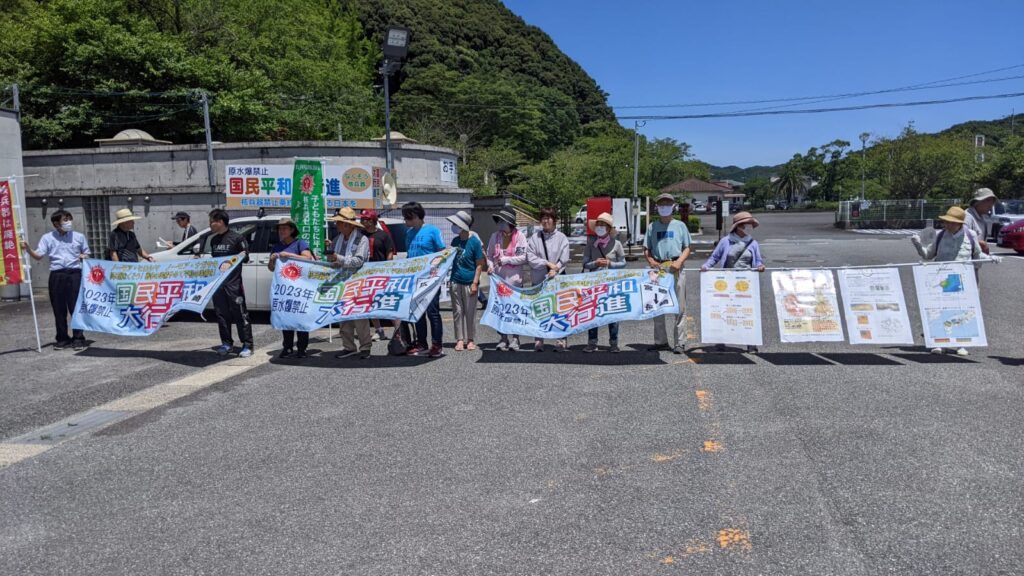
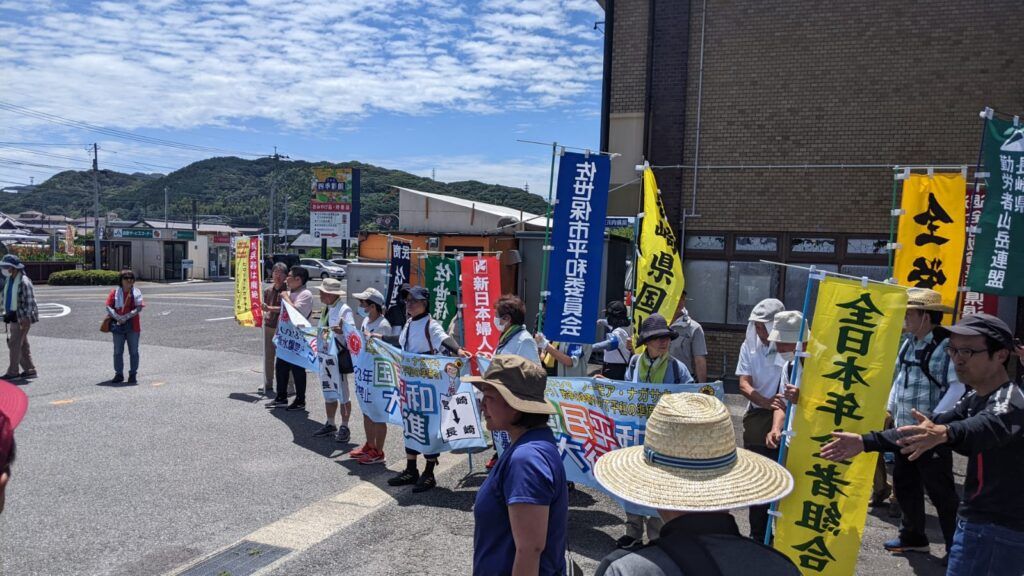
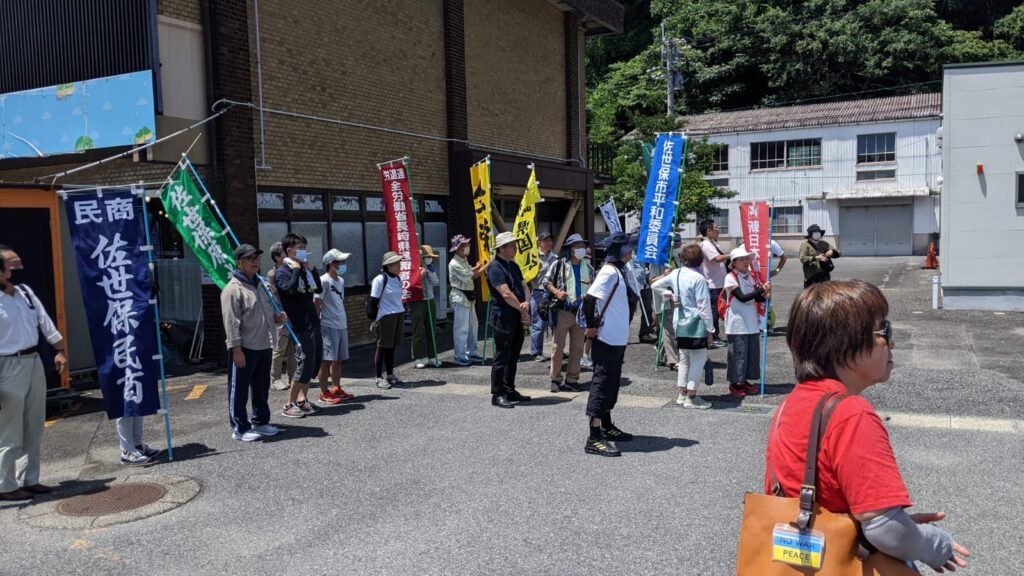
Free Boris Kagarlitsky!
IPB strongly protests against the arrest of Boris Kagarlitsky in Russia, a worldwide renown sociologist and peace activist. We see the charge against him of “justifying terrorism,” as undermining common efforts for world peace. We call on the Russian authorities to drop their charges and release Boris Kagarlitsky! A call “Free Boris Kagarlitsky!” has been made which we endorse. You find the petition here: https://chng.it/BWHFLtLZWV
Among the initiators were Reiner Braun, former Executive Director of IPB, Ingeborg Breines former chair of IPB and Tord Björk, member of the council of IPB. Others who have signed this appeal are Erkki Tuomija, former minister of Foreign Affairs in Finland; Rosa Elva Zúñiga from CEEAL and the World Social Forum movement in Mexico; Sergio Bassoli from the Italian trade union CGIL; Patrick Bond, climate justice activist from South Africa; Leo Gabriel, Member of the International Council of the World Social Forum; Joseph Gerson; President, Campaign for Peace, Disarmament and Common Security; Ulla Klötzer; Women for Peace, Finland; Laura Lodenius; Director, Peace Union of Finland; Francine Mestrum, Global Social Justice, Belgium; Mirek Prokeš, Alliance for Labour and Solidarity, Czechia, Prague Spring 2 – European network against right-wing extremism and populism; Håkan Svenneling, Member of Parliament and Foreign Policy spokesperson for the Left Party, Sweden; and Hilary Wainwright, Co- editor Red Pepper magazine.
The European Left Party and Transnational Institutet (TNI) have also made a statement to support Kagarlitsky. You find the European left #freekagarlitsky statement here: https://www.european-left.org/criminal-case-initiated-against-russian-left-wing-scientist-and-activist-boris-kagarlitsky. The call for solidarity with Dr Kagarlitsky, as well as all others being oppressed for advocating peace and defending democratic rights in Russia made by TNI can also be signed here: https://www.tni.org/en/article/we-condemn-the-arrest-of-russian-intellectual-boris-kagarlitsky. It has been supported among others by Naomi Klein, Yanis Varoufakis, Medea Benjamin, CodePink, David Adler, Progressive International, Walden Bello, Focus on the Global South, Pablo Solon, Edgardo Lander, Universidad de Venezuela, Caracas, Anthony Barnett, Co-founder, openDemocracy and Maude Barlow, co-founder of Council of Canadians.
For more information, please contact Tord Björk via email: tord.bjork@gmail.com, skype: tordbjork, tel: +46 (0)722 15 16 90
address: Kyrkängsbacken 8, 14135 Huddinge, Sweden
Statements on the G7 Hiroshima Summit 2023
Major economies gathered for the G7 Summit Meeting in Hiroshima, Japan, from May 19 to May 21, 2023. The G7 leaders reaffirmed their support for the Treaty on the Non-Proliferation of Nuclear Weapons and their commitment to nuclear disarmament and non-proliferation initiatives. But what’s the real deal?
Campaign for Nuclear Disarmament, Kate Hudson, and the Japan Council against Atomic and Hydrogen Bombs (Gensuikyo), Yasui Masakazu, issued their perspectives on the G7’s meeting and the current state of nuclear disarmament that we are in now. Their insights will give us the other side of the coin and a closer look at the nuclear issue that we are all facing.
Together, we call for a nuclear-free world—the genuine one.
1. Gensuikyo: Statement on the G7 Hiroshima Summit
We Protest against G7 Leaders for Turning their Backs on the Call of the Hibakusha and the PeopleSeeking the Prohibition and Abolition of Nuclear Weapons
By: Yasui Masakazu, Japan Council against Atomic and Hydrogen Bombs (Gensuikyo) on May 21, 2023
2. G7 hypocrisy in Hiroshima
By: Kate Hudson, Campaign for Nuclear Disarmament on May 30, 2023

